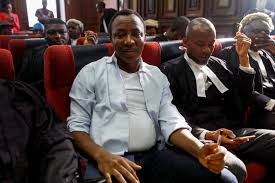
Daniel Otera
The packed courtroom in Abuja fell into a tense silence on Tuesday as activist and former presidential candidate Omoyele Sowore walked in, eyes steady, face unflinching. His arraignment on fresh cybercrime charges a case already stirring nationwide debate was meant to begin. Instead, the proceedings collapsed into legal wrangling, forcing the judge to push the trial to October 27, 2025.
The Federal Government, through the Department of State Services (DSS), has accused Sowore of wielding social media as a weapon of using his verified X handle, @YeleSowore, and his Facebook page to publish “false and defamatory” statements about President Bola Ahmed Tinubu. Among the posts at the heart of the case was one that read:
“This criminal @officialABAT actually went to Brazil to state that there is no more corruption under his regime in Nigeria. What audacity to lie shamelessly!”
To prosecutors, it was not just criticism it was an act designed to incite disorder and inflame the nation. To Sowore’s supporters, it was nothing more than the fearless truth-telling of a man long targeted for speaking against power.
The courtroom showdown quickly turned dramatic. Sowore’s lead counsel, Abubakar Marshall, stunned the court by declaring that his client had not even been properly served with the charges. Neither had X, listed as the second defendant, while Meta Platforms (Facebook’s parent company) stood in the dock as the third. Without proper service, the defence argued, the trial could not legally move forward.
The government’s lawyer, Mohammed Babadoko Abubakar, insisted otherwise. But when trial judge Justice Mohammed Garba examined the case file, the revelation was damning the activist had indeed not been served. At that moment, the tension broke; gasps rippled across the courtroom.
Desperate to salvage the moment, the prosecution moved to serve Sowore in open court. The activist extended his hand calmly and accepted the documents a quiet but symbolic act that underscored the spectacle unfolding.
Marshall immediately requested three days to study the charges, as the law allows. The prosecution bristled, calling it a stalling tactic. But Justice Garba cut through the bickering with a firm ruling: “This Court will adjourn to the 27th day of October for the arraignment of the defendants.”
That gavel strike meant more than delay it bought Sowore and his defence time, while ensuring the case remains in the public spotlight.
The five-count charge is sweeping:
Two counts under the Cybercrimes (Prohibition and Prevention) Act 2024, accusing Sowore of spreading falsehoods via X and Facebook.
Two counts of defamation under Section 375 of the Criminal Code.
One final count alleging he published false information to incite fear and damage the president’s reputation.
The case, registered as FHC/ABJ/CR/484/2025, does not only pit a single activist against the state. It places two of the world’s biggest tech giants X and Meta in the crosshairs, raising explosive questions about the responsibility of social media platforms in Nigeria’s turbulent political space.
The stakes are enormous. Press freedom in Nigeria is already on shaky ground. According to the Committee to Protect Journalists (CPJ), at least 25 Nigerian journalists were harassed or detained in 2023 alone. Critics warn that the government’s amended Cybercrimes Act, passed in 2024, could become a blunt instrument to silence dissent online. Civil society group SERAP has already filed legal challenges, while the U.S. Embassy has voiced concern that the law could muzzle free expression.
For Sowore, this is not unfamiliar terrain. His arrest in 2019 during the #RevolutionNow protests etched his name into Nigeria’s political struggle for accountability. Detained for treason, money laundering, and cybercrime, he became a symbol of the risks faced by journalists who dare confront power.
Now, as the October 27 date looms, the activist once again stands at the centre of a storm with the weight of state power on one side, and the fragile hopes of free expression on the other.
Outside the courthouse, whispers carried through the crowd of journalists, activists, and onlookers: Is this justice being served or speech being silenced?
